Advertisement
'We're Not Going Back To Crowded Shelters': The Scramble For Space To Shelter Homeless In Pandemic Winter
Resume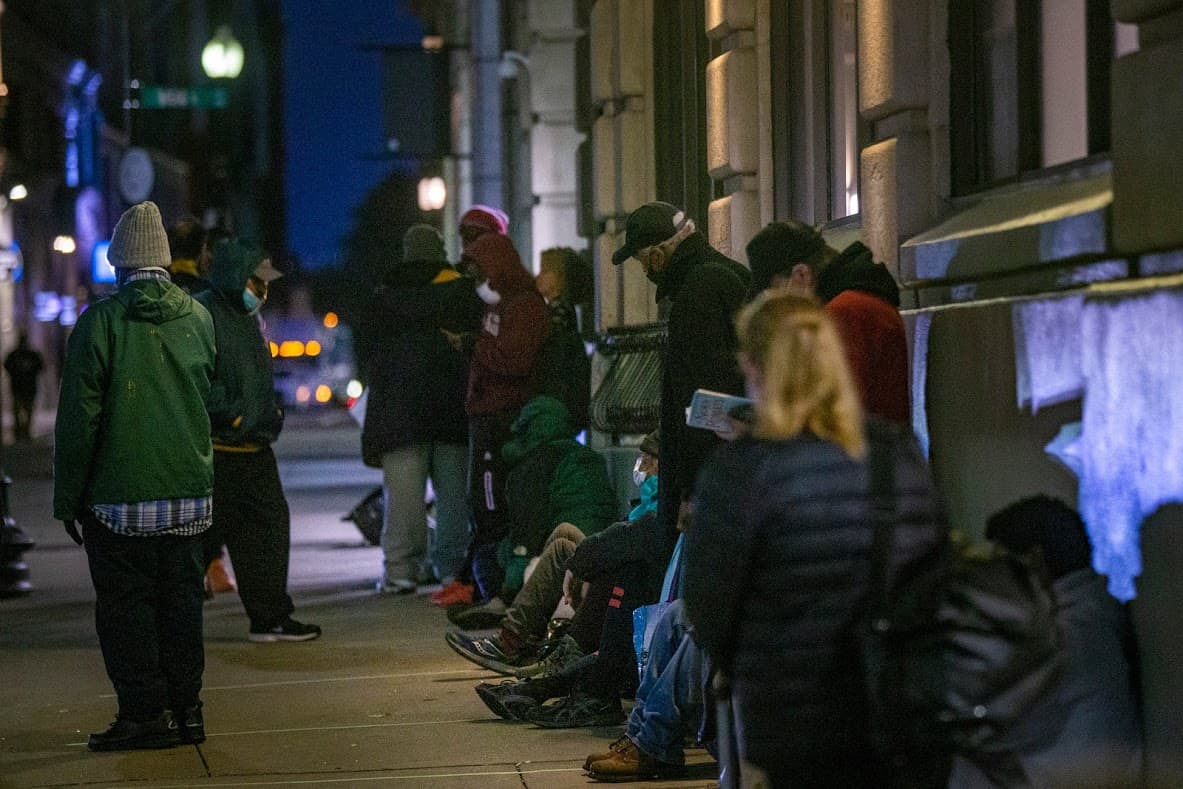
Homeless service providers in Massachusetts are scrambling to make sure they have enough space to shelter people and provide protection against the coronavirus as winter approaches.
Ntyshall Moore is one of those people. She said she's been homeless in Boston since she checked out of the state foster care system when she was 18.
"I've been in shelters, lived in the [Boston Common], lived in Park Street," Moore said.
Now 40, she's facing one of the toughest times of the last two-plus decades.
"Now it's hard for us to get into the shelters because of the coronavirus. And we have to get corona testing, which I understand," Moore said. "But there's limited beds."
Limited beds because shelters have spaced them at least six feet apart to comply with CDC guidelines.
Moore and her husband, Mark Doctor, said they prefer staying outside because they can be together. They duck into a doorway or behind a dumpster and use boxes to shield themselves from the wind. They pile on donated blankets, use hand warmers, and lie close to each other for warmth.
She's nervous she'll contract the coronavirus in a shelter. Moore is diabetic and has asthma, both of which can increase risk of complications from COVID-19.
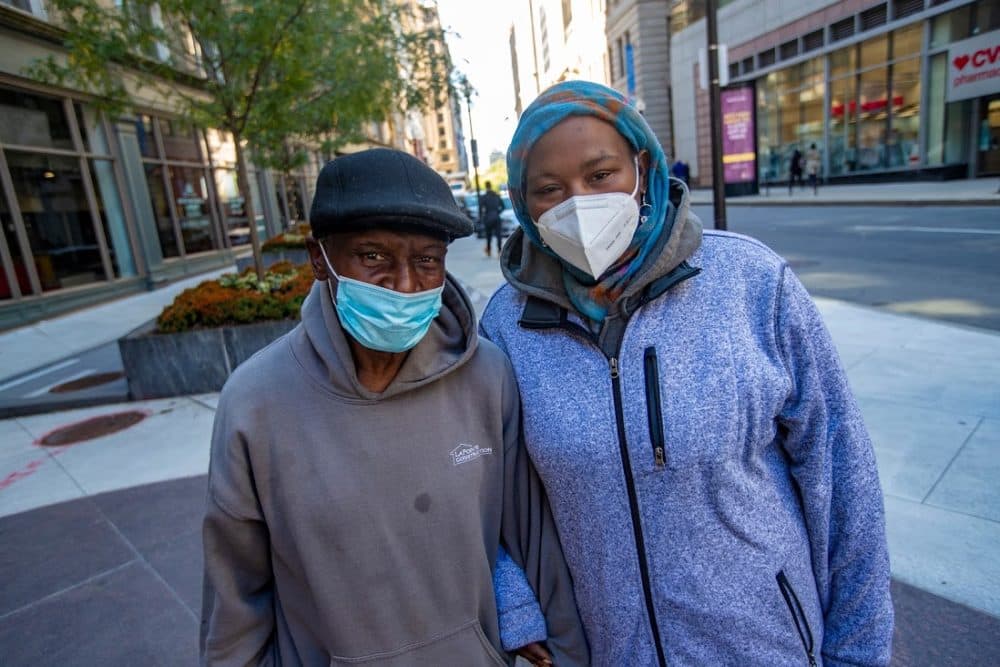
But according to Doctor, they've been calling shelters to get on waiting lists. As they look ahead to the coldest, snowiest nights, they know they'll want warm beds.
"You're only human. You have to be inside once it gets so cold," Doctor said. "Nature is nature. If you don't take over by staying out of the way, it will take over you by putting you under."
Boston Adds Shelter Space For Winter
In recent years, Boston has sheltered 97% to 98% of its homeless population. In winter, shelters have been overflowing with people sleeping on mats.
But in the pandemic, the percentage of people staying on the streets has risen. That's both because of the shelter capacity issue and because more people are choosing the streets over shelter out of fear of contracting the coronavirus.
The homeless service provider Pine Street Inn said its outreach workers made 35% more contacts with people on the street in September than they did in the same month last year. In August, those contacts were 40% higher than in 2019.
That increase in the population staying on the street can't continue into the winter, said Sheila Dillon, the city of Boston's housing chief and director of neighborhood development.
"No individual is going to find themselves out in the cold without a place to stay," Dillon said.
To that end, the city and organizations that serve people who are homeless have secured four additional shelter sites for the winter, according to Dillon.
"We're not going back to crowded shelters," she said. "It's impossible to say that if there's a really stormy night and we've got some people, you know, in a lobby. But that is not going to be the norm."
The four new sites will add 200 emergency shelter beds to the city's current COVID-limited capacity of 1,064, according to city officials. The facilities will be paid for with with a mix of state funds, federal CARES Act money, and private donations.
City leaders won't reveal the locations of the winter shelters, saying paperwork is still being finalized. Two will serve adults; the other two will be for teens and young adults. One is an upper floor of an existing shelter. Another is a hotel that's been under-utilized during the pandemic, Dillon said.
"The locations are scattered throughout Boston. They are not concentrated in any one neighborhood," she said. "And we have been very intentional not to put any more strain on the South End or the Mass-Cass area."
That's the area around Mass. Ave and Melnea Cass Boulevard, which already houses homelessness- and addiction-related services and has been hit hard by the opioid epidemic.
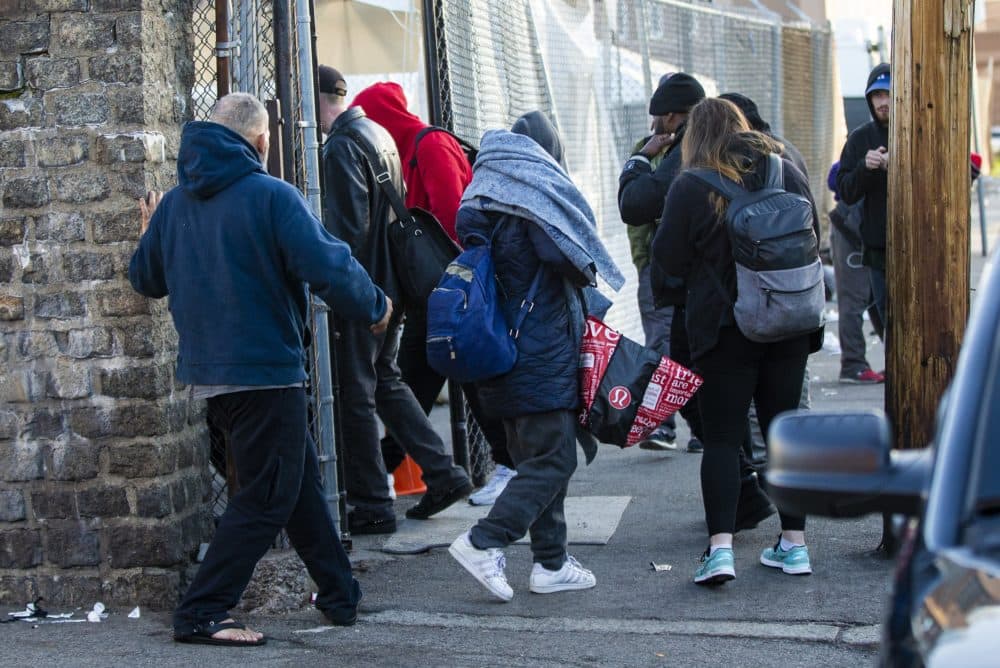
But even with the 200 additional shelter beds, the city faces a shortfall. Boston officials say to make up the difference, they're working with their nonprofit partners to try to house 150 people in apartments and rooming houses before the coldest weather hits. And they're relying on the state to help create additional shelter space around Massachusetts to lessen the strain.
One place that's happening is Worcester, which says it's already secured space for an additional 50 to 75 people experiencing homelessness over the winter. In Lowell, officials said they're short that many beds for winter but are working on adding to the supply.
'The System ... Is Still Going To Be Short'
A spokesperson for the state Department of Housing and Community Development, which funds emergency shelters, said the agency is working with shelters to better understand need and expand capacity, and is working to leverage both state and federal funds to make that possible. Right now there are more than 2,500 shelter beds for individuals in Massachusetts, according to DHCD; but the department did not answer WBUR's questions about whether it's projecting a shortfall.
Joyce Tavon is senior director of policy and programs for the advocacy organization Massachusetts Housing and Shelter Alliance. She said she's concerned about a shortage of shelter beds based on what she's heard from DHCD.
"That the system right now, even with the beds about to be added ... is still going to be short 800 beds this winter," Tavon said. "I mean, we know folks are working diligently to add more beds and reduce that gap. But it is not clear how many are actually going to be added."
And, Tavon said, it's not clear where those beds will be.
At the Pine Street Inn, COVID-related capacity issues over the last six months have forced staff to do something that goes against the organization's mission: tell people they can't come in. Pine Street leased a hotel for some guests it's working to house. But president and executive director Lyndia Downie said the organization had to limit its four shelters to about 60% of their regular population level.
"We want to be here for people," Downie said. "But at the same time, if we go back to the numbers we had before — even with the personal protective equipment, even with the work we've done on cleaning and sanitation — the COVID numbers are going to go up, and we're going to put people at risk. And we have a lot of people here who are older — you know, a lot of people have preexisting conditions.
"We don't want to go back to a 36% rate of COVID when it was just [a] very, very scary time for everybody."
That was back in April. After that, the positive test rate dropped to zero.
"We want to be here for people. But at the same time, if we go back to the [shelter population] we had before ... the COVID numbers are going to go up ... We don't want to go back to a 36% rate of COVID, when it was just [a] very, very scary time for everybody."
Lyndia Downie, Pine Street Inn president & executive director
Data provided to WBUR by Pine Street Inn show requests for shelter dipped through the summer. But in September, they went back up; almost 800 times last month, someone called or showed up looking for a bed.
The organization tries to help people find alternatives to shelter, such as a family member to take them in, according to Downie; that's successful about 20% of the time. It gives some people financial assistance. Or it refers them to the two shelters run by the Boston Public Health Commission. Those shelters haven't been turning anyone away due to space, according to the commission, which says that's partly because it set up an additional facility at an old hospital in Brighton. Eighty-four men are sheltered there.
The largest day shelter in Boston, St. Francis House, hasn't been sending people away, either. The shelter's president and CEO, Karen LaFrazia, wonders how long that can last.
"We've opened up spaces in the building to accommodate more people coming in," LaFrazia said. "But but at some point, we are going to be in a real dilemma."
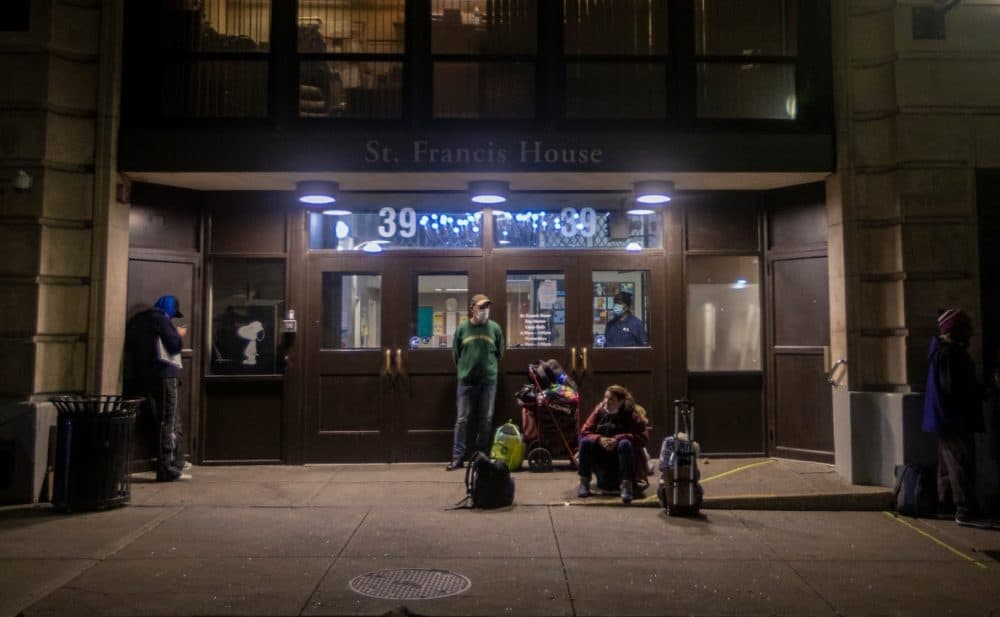
There's spread-out seating for only 125 people. St. Francis House currently serves about 300 clients over the course of an average day. They tend to take a shower, see their case manager or doctor, grab a boxed meal and go, LaFrazia said.
"But we know what's going to happen," she added. "It's not going to be nice out and people aren't going to want to leave. So those 300 people, even if we stayed at 300 people, they will want to and need to be in our building for longer amounts of time. And that's when the problem's gonna be most significant."
People experiencing homelessness also know they're in a race against Mother Nature. Dan Reid said being homeless in a pandemic is hard enough.
"And through this all I've been sober," said Reid, who was relaxing with some other men on City Hall Plaza, wearing a face mask with images of an American flag and a basketball. "I've got seven years clean ... and I'm just trying to do the right thing. And it just seems like more and more things get thrown in front of me to make me want to use again."
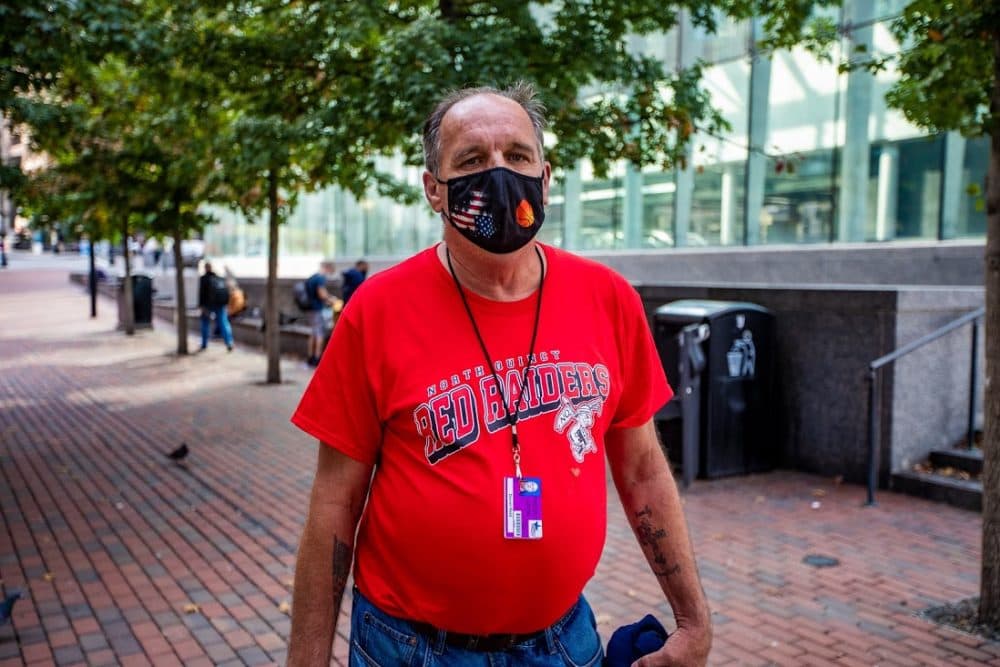
Reid is staying at the veterans' shelter in downtown Boston. He sleeps in a room with three other men. The other night, Reid said, one of his roommates was coughing all night. There is coronavirus testing at the shelter, but hearing that cough rattled him.
"I'm in my 60s and I have underlying diseases," he said. "So if I get this thing I'm going to be dead — there's no doubt in my mind."
Even with his income as a fully disabled veteran, Reid said, he struggles to find an apartment he can afford. He wants his own place to live before COVID-19 catches up with him.
This segment aired on October 16, 2020.
